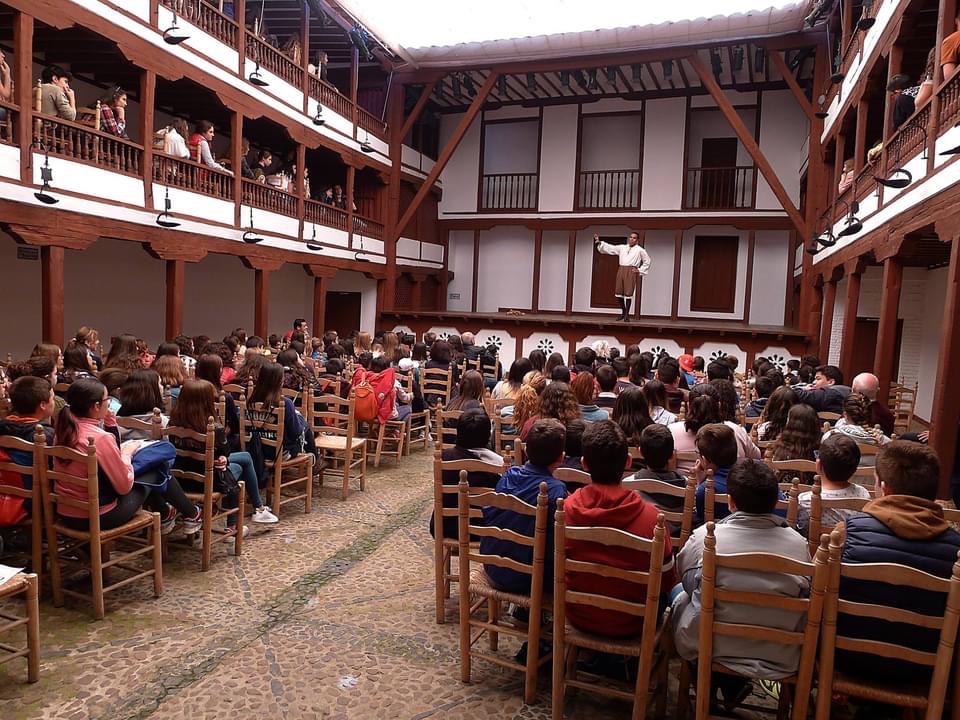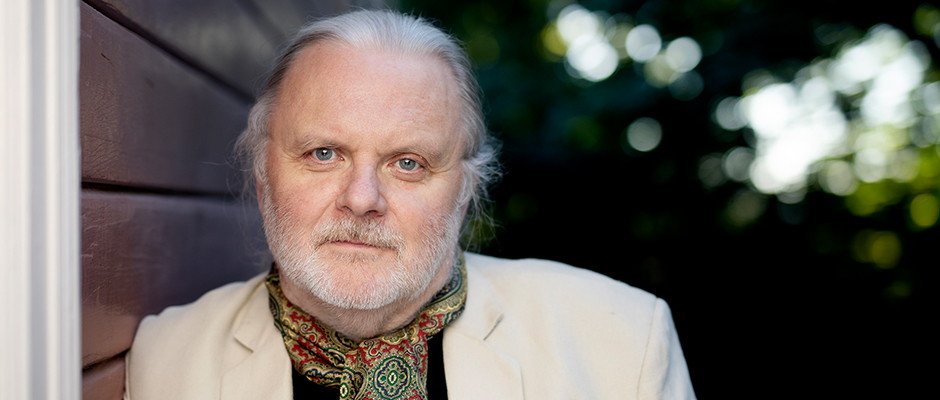Hola amigos de nortonteatro.blog. Yo soy Nortan Palacio, conocido artísticamente y entre los teatreros como Norton P.
Hello friends of nortonteatro.blog. I am Nortan palacio, Known artistically and among the people of the Theatre, as Norton P.

Miércoles 27 de marzo 2024.
ENGLISH VERSION: BELOW SPANISH VERSION
Estas semanas, las anécdotas del Mentidero de los Comediantes, están de descanso por la Pasión, pero no quería dejar pasar esta oportunidad para desear a mis lectores un FELIZ DÍA MUNDIAL DEL TEATRO. Y para tal celebración te dejo el mensaje mundial, escrito este año por el último Premio Nobel de Literatura (quien también es dramaturgo), el noruego Jon fosse. Y que, como no podía ser de otra manera, aboga por la paz. porque EL TEATRO TAMBIÉN ES PAZ.
Mensaje del Día Mundial del Teatro
Jon Fosse
Escritor y Dramaturgo noruego
Cada persona es única y, al mismo tiempo, como todas las demás. La apariencia, se puede ver, es cierto, pero también hay algo dentro de cada persona que le pertenece, que la hace única. Podemos llamarlo alma o espíritu, o bien, podríamos no ponerle palabras, simplemente dejar que este ahí.
Al mismo tiempo que somos diferentes, también somos iguales. Las personas de todo el mundo somos fundamentalmente iguales, sin importar qué lengua hablemos, qué color de piel o de cabello tengamos.
Quizás esto sea una especie de paradoja: que somos completamente iguales y diferentes al mismo tiempo. Tal vez una persona es paradójica en su conexión entre el cuerpo y el espíritu, entre lo terrenal y tangible y lo que trasciende los límites materiales y terrenales.
El arte, el buen arte, consigue a su manera y de forma fabulosa reunir lo absolutamente único con lo universal. Nos permite entender la diferencia entre lo extraño y lo universal. Al hacerlo, el arte trasciende las fronteras de los lenguajes y los límites geográficos. Reúne, no solo las cualidades individuales, sino también las características de un grupo de personas, por ejemplo, las naciones.
El arte no se expresa provocando que todo sea igual, por el contrario, nos muestra nuestras diferencias, aquello que es ajeno o extraño. Todo buen arte contiene precisamente eso: algo extraño, algo que no podemos comprender completamente y que, sin embargo, entendemos de cierto modo. Contiene lo enigmático, algo que nos fascina y por lo tanto nos lleva más allá de nuestros límites y así crea la trascendencia que todo arte debe contener y a la cual conducirnos.
No se me ocurre una mejor manera de unir los opuestos. Es exactamente el enfoque inverso al de los conflictos violentos que vemos a menudo en el mundo, que alimentan la tentación destructiva de aniquilar todo lo extraño, todo lo único y diferente, comúnmente utilizando los inventos más inhumanos que la tecnología ha puesto a nuestra disposición. Hay terrorismo en este mundo. Hay guerra, puesto que la gente tiene un lado animal que lo lleva a ver lo extraño como una amenaza a su propia existencia, en lugar de ver el fascinante enigma que eso repre- senta.
Y entonces lo único, lo diferente que es universalmente comprensible, desaparece. Dejando atrás una semejanza colectiva donde todo lo diferente es una amenaza que debe ser erradica- da. Lo que vemos desde fuera, se ve como desigualdad; por ejemplo, las religiones o ideologías políticas se convierten en algo que debe ser derrotado y destruido.
La guerra es la batalla contra lo que yace en lo mas profundo de cada uno de nosotros: lo único. Y es una batalla contra todo arte, contra la esencia mas íntima de todo arte.
He hablado del arte en general, no del arte teatral en particular, esto se debe a que todo buen arte, en el fondo, gira en torno a lo mismo: tomar lo singular y específico para hacerlo universal. Articula en su expresión artística aquello único con lo universal: no eliminando lo singular, sino enfatizándolo; dejando que lo extraño y lo desconocido brille claramente.
Es tan simple como que la guerra y el arte son opuestos, que la guerra y la paz son opuestos. El arte es paz.
JON FOSSE

These weeks, the anecdotes of the Mentidero of the Comedians, are resting for the Passion, but I did not want to miss this opportunity to wish my readers a HAPPY WORLD THEATER DAY. And for such a celebration I leave you the world message, written this year by the last Nobel Prize in Literature (who is also a playwright), the Norwegian Jon fosse. And that, of course, advocates peace. because THEATRE IS PEACE.
World Theatre Day Message 2024 by Jon FOSSE
Art Is Peace
Every person is unique and yet also like every other person. Our visible, external appearance is different from everyone else’s, of course, that is all well and good, but there is also something inside each and every one of us which belongs to that person alone—which is that person alone. We might call this their spirit, or their soul. Or else we can decide not to label it at all in words, just leave it alone.
But while we are all unlike one another, we’re alike too. People from every part of the world are fundamentally similar, no matter what language we speak, what skin color we have, what hair color we have.
This may be something of a paradox: that we are completely alike and utterly dissimilar at the same time. Maybe a person is intrinsically paradoxical, in our bridging of body and soul—we encompass both the most earthbound, tangible existence and something that transcends these material, earthbound limits.
Art, good art, manages in its wonderful way to combine the utterly unique with the universal. It lets us understand what is different—what is foreign, you might say—as being universal. By doing so, art breaks through the boundaries between languages, geographical regions, countries. It brings together not just everyone’s individual qualities but also, in another sense, the individual characteristics of every group of people, for example of every nation.
Art does this not by levelling differences and making everything the same, but, on the contrary, by showing us what is different from us, what is alien or foreign. All good art contains precisely that: something alien, something we cannot completely understand and yet at the same time do understand, in a way. It contains a mystery, so to speak. Something that fascinates us and thus pushes us beyond our limits and in so doing creates the transcendence that all art must both contain in itself and lead us to.
I know of no better way to bring opposites together. This is the exact reverse approach from that of the violent conflicts we see all too often in the world, which indulge the destructive temptation to annihilate anything foreign, anything unique and different, often by using the most inhuman inventions technology has put at our disposal. There is terrorism in the world. There is war. For people have an animalistic side, too, driven by the instinct to experience the other, the foreign, as a threat to one’s own existence rather than as a fascinating mystery.
This is how uniqueness—the differences we all can see—disappear, leaving behind a collective sameness where anything different is a threat that needs to be eradicated. What is seen from without as a difference, for example in religion or political ideology, becomes something that needs to be defeated and destroyed.
War is the battle against what lies deep inside all of us: something unique. And it is also a battle against art, against what lies deep inside all art.
I have been speaking here about art in general, not about theater or playwriting in particular, but that is because, as I’ve said, all good art, deep down, revolves around the same thing: taking the utterly unique, the utterly specific, and making it universal. Uniting the particular with the universal by means of expressing it artistically: not eliminating its specificity but emphasizing this specificity, letting what is foreign and unfamiliar shine clearly through.
War and art are opposites, just as war and peace are opposites—it’s as simple as that. Art is peace.
JON FOSSE.
Translated by: Damion Searls

Gracias Norton por este homenaje al teatro en su fiesta anual 🥰
Me gustaMe gusta
Muy buenas noches querido Norton muy bien escrito y bien dicho el arte es la paz y mucho mejor que la guerra ojalá estuviera más arte que guerra. Gracias un saludo y sigue escribiendo.
Me gustaMe gusta